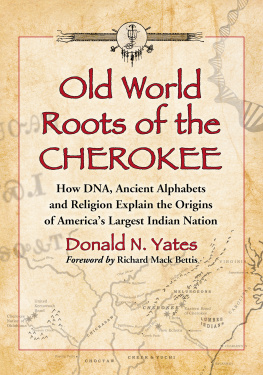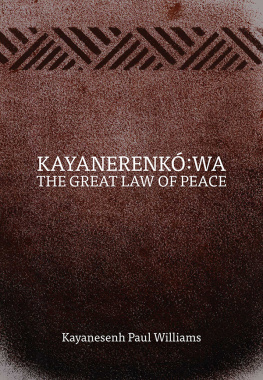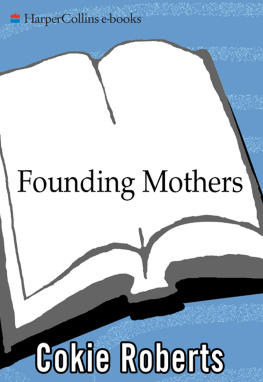Cover image: Womans Nomination , by Brandon Lazore, courtesy of the artist
Published by State University of New York Press, Albany
2017 State University of New York
All rights reserved
Printed in the United States of America
No part of this book may be used or reproduced in any manner whatsoever without written permission. No part of this book may be stored in a retrieval system or transmitted in any form or by any means including electronic, electrostatic, magnetic tape, mechanical, photocopying, recording, or otherwise without the prior permission in writing of the publisher.
For information, contact State University of New York Press, Albany, NY
www.sunypress.edu
Production, Eileen Nizer
Marketing, Michael Campochiaro
Library of Congress Cataloging-in-Publication Data
Names: Rodriguez, Jeanette, 1954 | Wakerahkats:teh, Iakoiane.
Title: A clan mothers call : reconstructing Haudenosaunee cultural memory / Jeanette Rodriguez, Ph.D. ; with Iakoiane Wakerahkats:teh, Condoled Bear Clan Mother of the Kanienkeh:ka Nation.
Description: Albany : State University of New York Press, 2017. | Series: SUNY series in critical Haudenosaunee studies | Includes bibliographical references and index.
Identifiers: LCCN 2016041496 (print) | LCCN 2017017894 (ebook) | ISBN 9781438466255 (ebook) | ISBN 9781438466231 (hardcover : alk. paper)
Subjects: LCSH: Iroquois Indians. | Wakerakatste, Iakoiane. | Iroquois womenBiography. | Iroquois IndiansSocial life and customs. | Mohawk womenBiography. | Mohawk IndiansSocial life and customs. | Indian womenNorth AmericaHistory. | Sex roleNorth America. | Indians of North AmericaRites and ceremonies.
Classification: LCC E99.I7 (ebook) | LCC E99.I7 R584 2017 (print) | DDC 974.7004/9755dc23
LC record available at https://lccn.loc.gov/2016041496
10 9 8 7 6 5 4 3 2 1
We dedicate this book to all indigenous daughters of the earth so that they can inherit our world without persecution, and that their creator-given gift to bring forth life is returned to a place of high honor. And to our sons, we return you to your primal role of protector so that you may stand in balance during this time of great renewal.
A nation is not conquered until the hearts of its women are on the ground. Then it is done, no matter how brave its warriors nor how strong their weapons.
Cheyenne proverb
The phenomenon of the Indian heart is unyielding in its ability to survive and to endlessly hold a love for the land we regard as our mother and we as her children.
Iakoiane Wakerahkats:teh, Condoled Bear Clan Mother of the Kanienkeh:ka Nation
This is to be strong of mind, O chiefs: Carry no anger and hold no grudges. Think not forever of yourselves, O chiefs, nor of your own generations. Think of the continuing generations of our families, think of our grandchildren and of those yet unborn, whose faces are coming from beneath the ground.
The Peacemaker
Acknowledgments
A book that enters the heart of a People could not be written without the generosity of the People themselves sharing who they are, their hopes, and aspirations.
I begin these acknowledgments by first giving thanks to Iakoiane Wakerahkats:teh, Bear Clan Matron of the Kanienkeh:ka (Mohawk) Nation at Akwesasne, for opening her heart and community to me. I thank all the Kanienkeh:ka women and men who took the time to share their stories and vision; these tales were always heart-filled, inspiring, and were at times also difficult to share. It is this willingness to share from a deep, heartfelt place that provides the bridge for various communities to engage one another. Trust is a fragile entity that takes a long time to build.
The material in this book adds another voice to the literature and scholarship about the Haudenosauneebut from a distinctive Haudenosaunee source. As such, I am grateful for the risk that Iakoiane Wakerahkats:teh took in allowing me to come into her communitys land and transcribe her thoughts. Indigenous peoples are distrustful of others for two reasons: first, outsiders have historically entered their communities and taken without giving back; second, indigenous communities have largely been misrepresented, especially when it comes to womens roles within the nation. For these reasons and more, I am incredibly grateful for the trust extended to me, especially given the resistance that both Iakoiane Wakerahkats:teh and I encountered during the creation of the book. I come upon the Haudenosaunee land in a spirit of humility, knowing that I am neither of the Kanienkeh:ka Nation nor their traditions. I come as a scholar of religion and culture, desiring to gain both an intellectual and experiential understanding of the Kanienkeh:ka.
I am appreciative of Dean Powers of Seattle University for granting me the Deans Faculty Fellowship Grant and Dr. Ted Fortier, director of Canadian Studies at Seattle University, both of whom provided the financial support that made my fieldwork possible. I also wish to thank my friends and colleagues, Drs. Sharon Callahan, Christi Eppler, James Hembree, Nalini Iyer, and Christina Roberts, for their insights, questions, and critiques during the writing of this book. I am grateful for the commitment of my exemplary research assistant, Lauren Woo-Ermacoff, who has dedicated over three years of her time to this project. Her keen intellect, sharp eyes, and nimble fingers transcribed tapes, analyzed documents, and edited this manuscript. I am additionally extremely thankful to Nancy Marshall and Lauren St. Pierre for their continuous efforts, as well as my wonderful student research assistants Danielle Winslow and Tori Head, who demonstrated enthusiasm, skill, and patience while reviewing documents; and Amanda Lanne-Camilli and Chelsea Miller at the State University of New York Press. What I appreciated most about those who assisted in this project was not only their skill and competency to do the research, but their enthusiasm and openness to the subject matter. They exemplify the next generation: eager to learn and seek reconciliation.
Finally, research is made easier with the help of librarians and archivists willing to assist in finding potentially lost documents. For this, I wish to thank Rose Chou, reference archivist at the National Anthropological Archives at the Smithsonian Institution, and reference librarians Karen Gilles and Mary Sepulveda from Seattle University.










